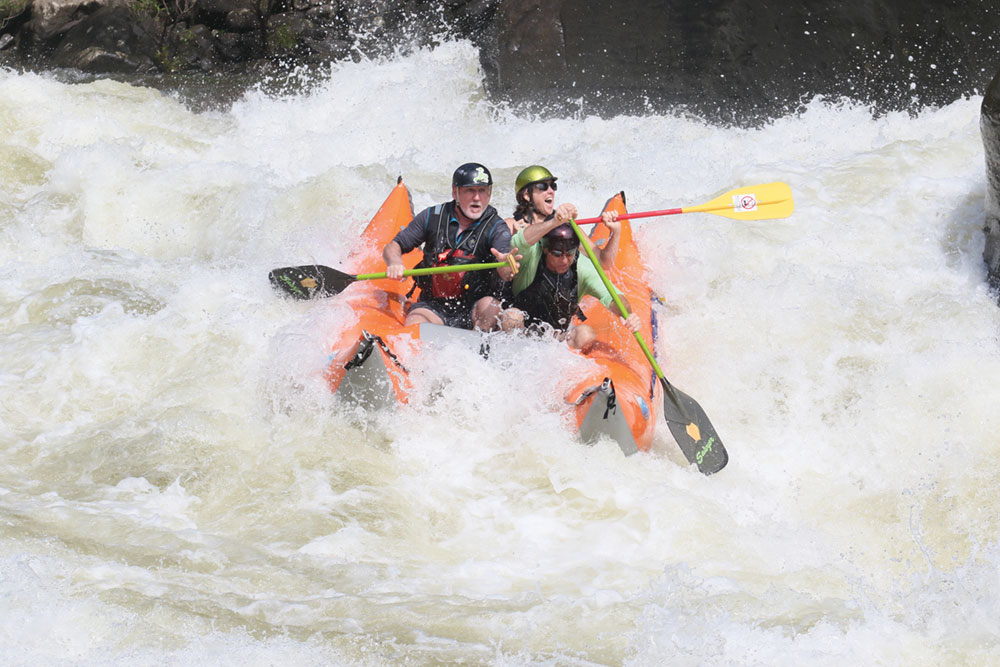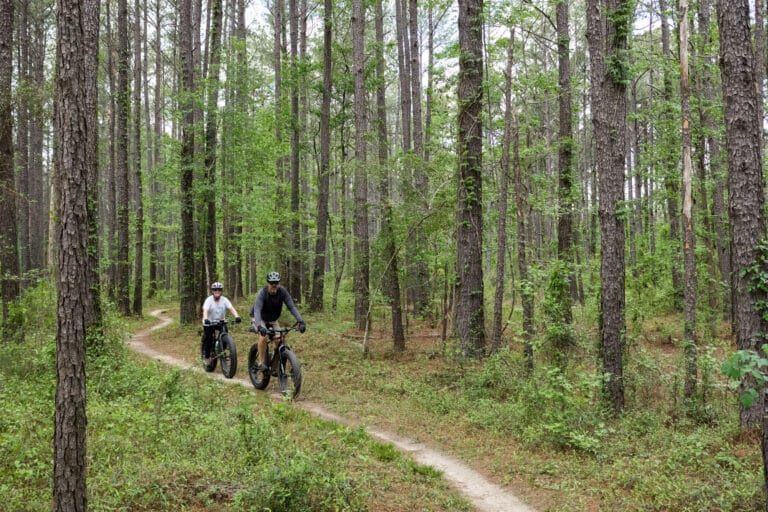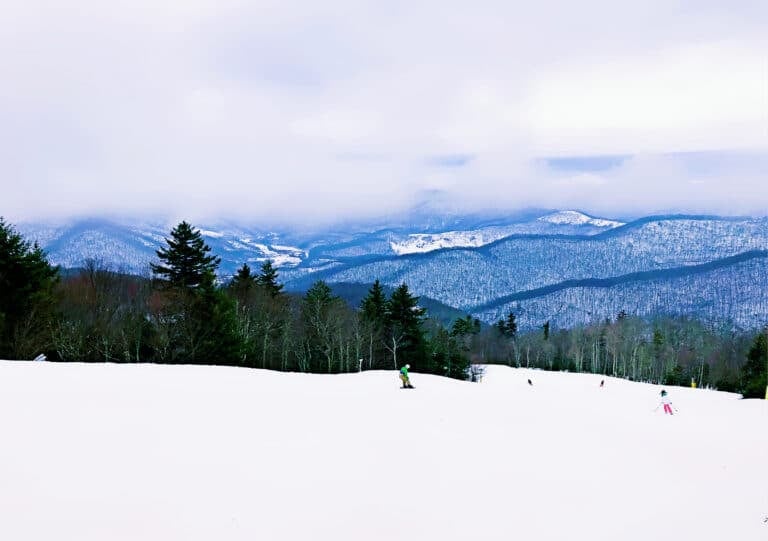An Avid Adventurer Faces Her Toughest Challenge After Suffering a Sudden Brain Aneurysm
Crowds of people stood high on a cliff, watching the carnage of boaters flipping through a Class V rapid on the Gauley River, when a stray kayaker took an entirely rogue line, flipping her boat upside down before it became solidly wedged between boulders, the waves violently slamming against it to ensure its entrapment. We could see the point of the boat wagging against her futile efforts to dislodge.
There was nothing we could do that wouldn’t take at least 20 minutes to safely get to her. We made our way to the river’s edge. I held my breath so that I wouldn’t cry, but also because I wanted to clearly understand how much air she had left before we watched her die. I was already out of breath when she suddenly emerged next to the boat after a successful wet exit that left her clinging to the boulder, still out of our reach. Tyler threw a rope that she was too exhausted to grab and she didn’t look capable of making it to shore without physical help. I could not believe that she was alive.
Forest rangers quickly arrived and worked for over half an hour to get her to the river’s edge where she stood bewildered, trying to comprehend what the hell just happened. I made my way along the overhanging cliff, grabbed her by the shoulders, looked frantically into her face, and said, “We just watched you die. You understand that, right? You are a badass for getting out of that boat. You were just now given another chance. You’ve gotta step away from here knowing that!”
She held my gaze and we both simultaneously burst into tears, hugging.
I don’t even know her name, and even after that river trip many years ago I still think about her a lot. But on this strange year’s Summer Solstice I pirouetted my own slack line over the abyss of ever after.
I woke up excited about plans to celebrate the longest day of the year with my besties. I hopped excitedly downstairs and said good morning to my 17-year-old son before climbing back in bed, waiting for coffee. My 12-year-old boy was fortunately at my girlfriend’s farm three hours east. I pulled the delicious covers back up and felt a sudden, fierce pain at the base of my skull, increasing and sliding over my head; a thunderclap headache.
I began violently puking, rolling onto the floor, crawling to the bathroom, shitting myself. I did a mental checklist and knew this was serious. I weakly called for my son and got under the hot shower, in too much pain to cry. I slipped into dirty clothes on the floor while still calling for him and tried texting to cancel the day’s plans. It was cryptic. Friends later told me they assumed it was my 89-year-old father having an emergency. I tried dialing 9-1-1, but could not remember the numbers. I looked at my “favorites” list in case someone driving here would be faster than an ambulance, when my son finally walked in and I begged him to drive me to the emergency room.
My head hurt so badly that I couldn’t walk, and my vision was blinded with white light. I slid downstairs and crawled across cobblestones. I sprawled across the back seat of the car, shivering violently, asking for the heat on high on a 75-degree morning.
Emergency room docs diagnosed me after a head CT with an aneurysm, caused by a spontaneous arterial rupture, and loaded me into an ambulance to the next hospital where doctors would attempt to coil the artery via angiogram. The burst was in a rare spot, far into my frontal lobe, so they were unable to reach it. My friends tracked me down, and despite COVID-19 restrictions, Mary was there, holding my face as I breathed out tearful gratitude among curse words. By the end of the day, I was on board a helicopter heading for UNC-Chapel Hill Medical Center.
Another coiling attempt failed, leading me to a seven-hour surgery, which left me with a bloody drain hanging off the side of my head, a six-inch sutured gash, and a black eye. Despite the intravenous load of meds, I writhed in pain, my blood pressure fluctuating wildly.
In the following days, I slipped in and out of consciousness while pain levels rarely changed. It hurt too much to cry. I hated talking, and saying a few simple sentences was overwhelming. For some reason I was able to text. I don’t remember this, but days later I saw I was able to set friends up on a blind date without being conscious.
I couldn’t find a comfortable position, and now Jodi was here to rub my head, wash my hair, feed me food that I immediately vomited, and be my advocate and rock. The village I spent 51 years creating took care of my children and father with dementia. Biz even cut my papa’s awful toenails and brought him flowers.
Each day I tried to get stronger. I tried to eat. I drank water. I went for short walks. I could not think about tomorrow or what came next. I could only breathe through the moment.
As I improved, I read research on aneurysms and learned that 50 percent of patients die before making it to the hospital. Of the 50 percent remaining, only 16 percent will be unscathed, without stroke symptoms. I stopped reading. I was not yet out of the woods. Lying in bed for two weeks, starving, resulted in extreme muscle loss. The doctor said that every day in bed translates to one week of lost strength. Once the head pain began dissipating they took me off the Oxycodone and sent me to the step-down floor.
I was surprised with discharge plans as the Fourth of July weekend approached, so my children’s father made the three-hour trek to bring me home. He pulled up, gathered me, and I suddenly fully realized that I had been through something big. Other people had been waiting for word each day of my survival, while I had been just trying to comprehend the present.
Once home, I walked across the cobblestones, and my younger son burst out the door to greet me with the most life-sustaining hug we had for each other. I suddenly felt the exact same intensity from the moment I first met him after doctors surgically removed him from me. He was a survivor too.
Months later I am still unraveling and constantly questioning myself. I wonder about my perspective coming from a trauma brain that is overly emotional, forgetful, easily overstimulated, and quickly triggered, and I wonder if other people look at me and see something different or wrong. I am still attempting to decipher the hidden treasures I should appreciate and how to proceed in life as a person now on bonus time.
I am not the same Bettina. I am a physically weakened but mentally more resilient version of her. I am just getting to know her. She has the same powerful experiences, and the same fire in her soul to keep thriving and exploring, but she is more present, and her love is more powerful.
My friend Michelle told me that the pressure of “doing something meaningful with your life” to honor the gift of survival can cause anxiety. But I’m intent on celebrating each fantastic moment with even more zest. In the fall I went to the Gauley River for another wild ride, and when I found myself trapped underwater beneath the boat in the most dangerous rapid on that river, I had no angst, and I was not nearly afraid of dying.
Cover photo: The author (back right) excitedly navigates a rapid on West Virginia’s Gauley River. photo by Whitewater photography; courtesy of the author








